DeeP MeLT News
June 2023: Haozhou He successfully defends his Ph.D. thesis
| Haozhou He defended her Ph.D. entitled "HNumerical modeling of discontinuous processes in geomaterials and geosystems," in front of a jury composed of Chloé Arson (Georgia Tech, supervisor), Sheng Dai (Georgia Tech), Lauren Stewart (Georgia Tech), Daniel Goldman (Georgia Tech) and Seth Busetti (ARAMCO). Haozhou presented his work with ease and provided excellent answers to the wide variety of questions that were asked by the jury. Haozhou was acknowledged as an expert in computational geomechanics. Haozhou is starting a position of numerical modeling research engineer at PPG Industries in July 2023. All the best to you, Haozhou! |
|
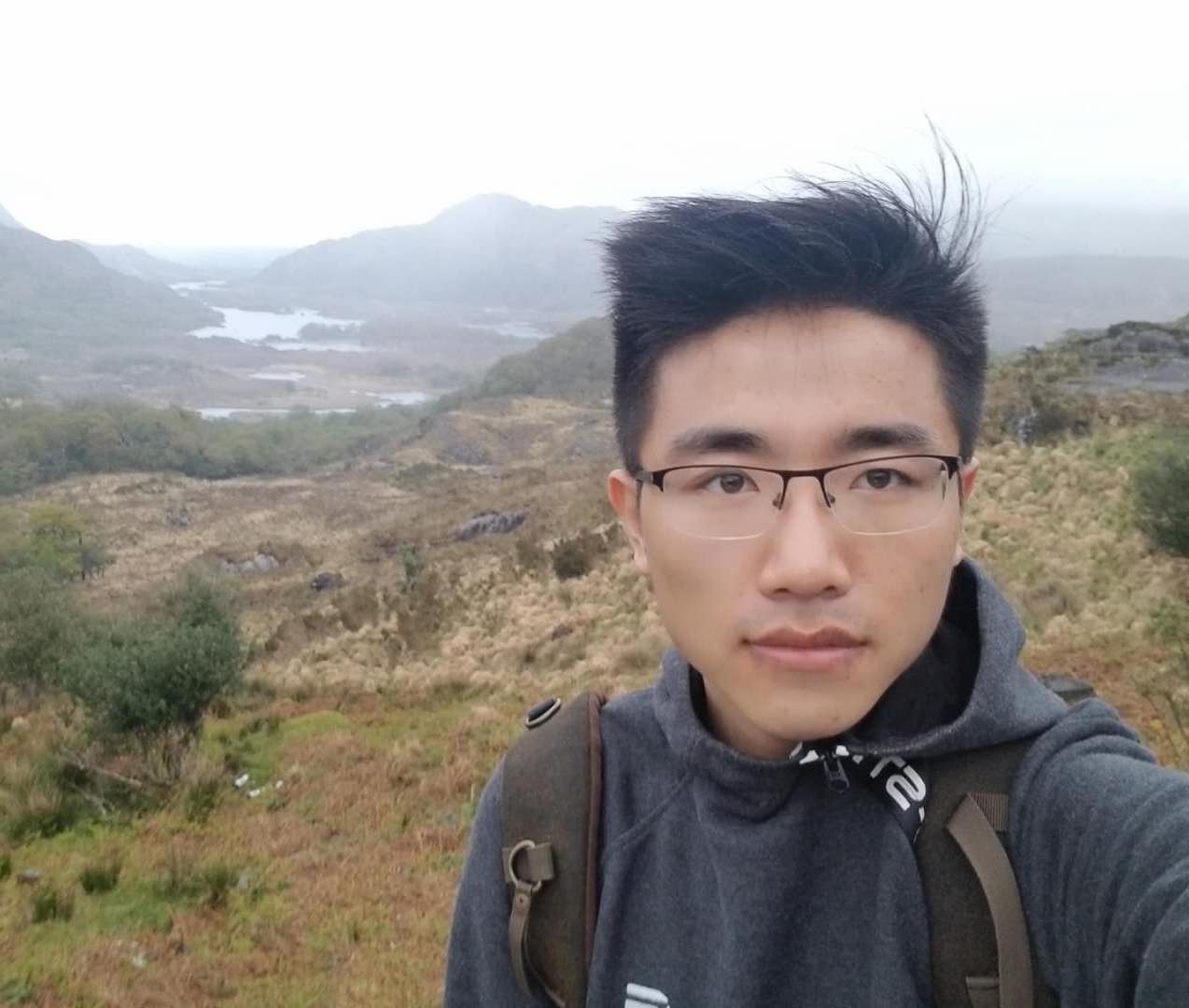
|
June 2023: Drs. Arson and Yang host the EMI 2023 conference at Georgia Tech
| The 2023 edition of the conference of the Engineering Mechanics Institute (EMI) took place at Georgia Tech on June 6-9, 2023. The EMI is the mechanics branch of the American Society of Civil Engineers (ASCE). It gathers scholars in theoretical and computational mechanics, constitutive modeling, experimental methods, optimization, instrumentation, uncertainty quantification and more. Every EMI conference typically attracts researchers beyond civil engineering, in particular, scholars in mechanical engineering, aerospace engineering, biomechanical engineering, material sciences and geophysics. The EMI 2023 conference gathered over 830 participants and offered over 65 parallel sessions, 6 keynote lectures and 6 workshops. |
November 2022: Tingting Xu successfully defends her Ph.D. thesis
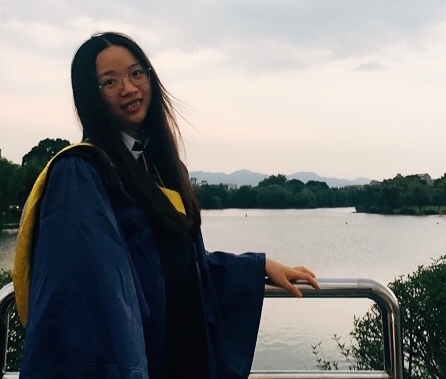
|
|
Tingting Xu defended her Ph.D. entitled "Homogenization of coupled deformation, damage and diffusion processes in rocks and finite element applcations in geomechanics and geommorphology," in front of a jury composed of Chloé Arson (Georgia Tech, supervisor), Susan Burns (Georgia Tech), Sheng Dai (Georgia Tech), Martial Taillefert (Georgia Tech), Yida Zhang (University of Colorado in Boulder) and Sébastien Brisard (Ecole des Ponts Paris Tech, France). Tingting delivered a clear and synthetic presentation of her thesis and, with mastery, answered a variety of questions spanning the fields of micromechanics, homogenization, geomechanics, physics and geochemistry. Tingitng was commanded for the depth of the knowledge that she acquired on the homogenization theory and she was congratulated for successfully treating truly multi-scale problems, from the microscopic scale to the metric scale, by combining micromechanics and the Finite Element Method. Tingting will start a postdocotral position on topology optimization at the Johns Hopkins University in January 2023. All the best to you, Tingting! |
November 2022: Dr. Arson is appointed to the Susan G. and Christopher D. Pappas Professorship
| This Professorship holds for five years and will be effective as of January 1, 2023. It is the result of a generous gift from Susan (CE 1978) and Chris (CE 1978) Pappas. In honor of Susan being one of the first 100 women to graduate from the School of Civil and Environmental Engineering at Georgia Tech, they added a preference that the professorship be awarded to a woman faculty member working in a technically rigorous area within CEE. The Professorship was awarded to Dr. Chloé Arson based on the recommendation of a committee that evaluated all the eligible candidates in Civil and Environmental Engineering. Here is the full story published by the School of Civil and Environmental Engineering. |
November 2021: Dr. Arson receives the prestigious NSF BRITE Award

|
|
The NSF BRITE (Boosting Research Ideas for Transformative and Equitable Advances in Engineering) initiative aims to enable and create opportunities to advance scientific discoveries and new research using a variety of approaches that harness the national talent ecosystem of experienced faculty. Recognizing that a successful faculty research career is neither linear nor continuous, this BRITE solicitation seeks proposals that enable experienced researchers and scholars (tenured or equivalent) to forge new directions or to enter new fields by capitalizing or branching out of their established knowledge domains. |
August 2021: A new DOE grant on modeling water-cleansing wetlands in extreme weather
Dr. Arson is part of an inter-disciplinary team of researchers who will study the influence of cycles of floods and droughts on the production of green house gases in riparian zones. The project engages experts in geomchemistry, biology and applied mechanics at Georgia Tech and in National Laboratories, and is funded by the Department of Energy (DOE). Here is the full story.
June 2021: Biot-Bazant conference: a new model of symposium in hybrid form
Dr. Arson is a co-organizer of the Biot-Bazant conference, a one-time fusion between the 2019 Concreep conference (postponed because of the pandemic), and the 2021 Biot conference on poromechanics. This three-minute video explains the concept of the hybrid Biot-Bazant conference, which will be held in June 2021 both remotely and physically, on the campus of Northwestern University.
November 2020: Floriana Anselmucci successfully defends her Ph.D. thesis
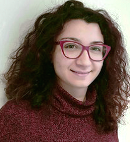
|
|
Floriana Anselmucci defended her Ph.D. entitled "Root-soil interaction: Effects on soil microstructure" in Grenoble (France) in front of a jury composed of Luc Sibille (L3SR, France, co-supervisor), Chloé Arson (Georgia Tech, co-supervisor), Laurent Oxarango (L3SR, France, Jury President), Jean-Yves Delenne (INRAE, France, reporter), Alessandro Tarantino (University of Stathclyde, UK, reporter), Barbara Mazzolai (Italian Institute of Technology, Italy), Glyn Bengough (University of Dundee, UK), Cino Viggiani (L3SR, France), Eddy Ando (L3SR, France). The presentation was in hybrid mode, with some of the members attending remotely and others, masked, in person. Floriana was commanded for her clear presentation, her mastery of the topic and the scientific maturity that she demonstrated during the questions. The Jury concluded that Floriana had acquired skills that are critical to a successful career in academia. We wish her the best! |
October 2020: L. Fernando Patino-Ramirez successfully defends his Ph.D. thesis
| L. Fernando Patino-Ramirez defended his Ph.D. thesis, entitled "Infrastructure network enhancement inspired by nature" in front of a committee constituted of Dr. C. Arson (Georgia Tech, CEE), Dr. B. Caicedo (Univ. Los Andes, Colombia), Dr. P. Chau (Georgia Tech, CSE), Dr. S. Dai (Georgia Tech, CEE), Dr. J.D. Frost (Georgia Tech, CEE) and Dr. G. Viggiani (L3SR, France). Fernando studied infrastructure at three scales: cavity section, tunnel alignment and infrastructure network. He demonstrated the limits of classic cavity expansion theories for practical problems at shallow depth through experimentatation with CT scanning and machine learning algorithms. He collaborated with biologists to understand why leaf venations and slime mold networks are effective and resilient, and found that biological network dynamics can be used to save considerable amounts of time and effort in designing adaptable networks. Fernando will start a post-doctoral position at Imperial College London (U.K.) in January 2021. |
|
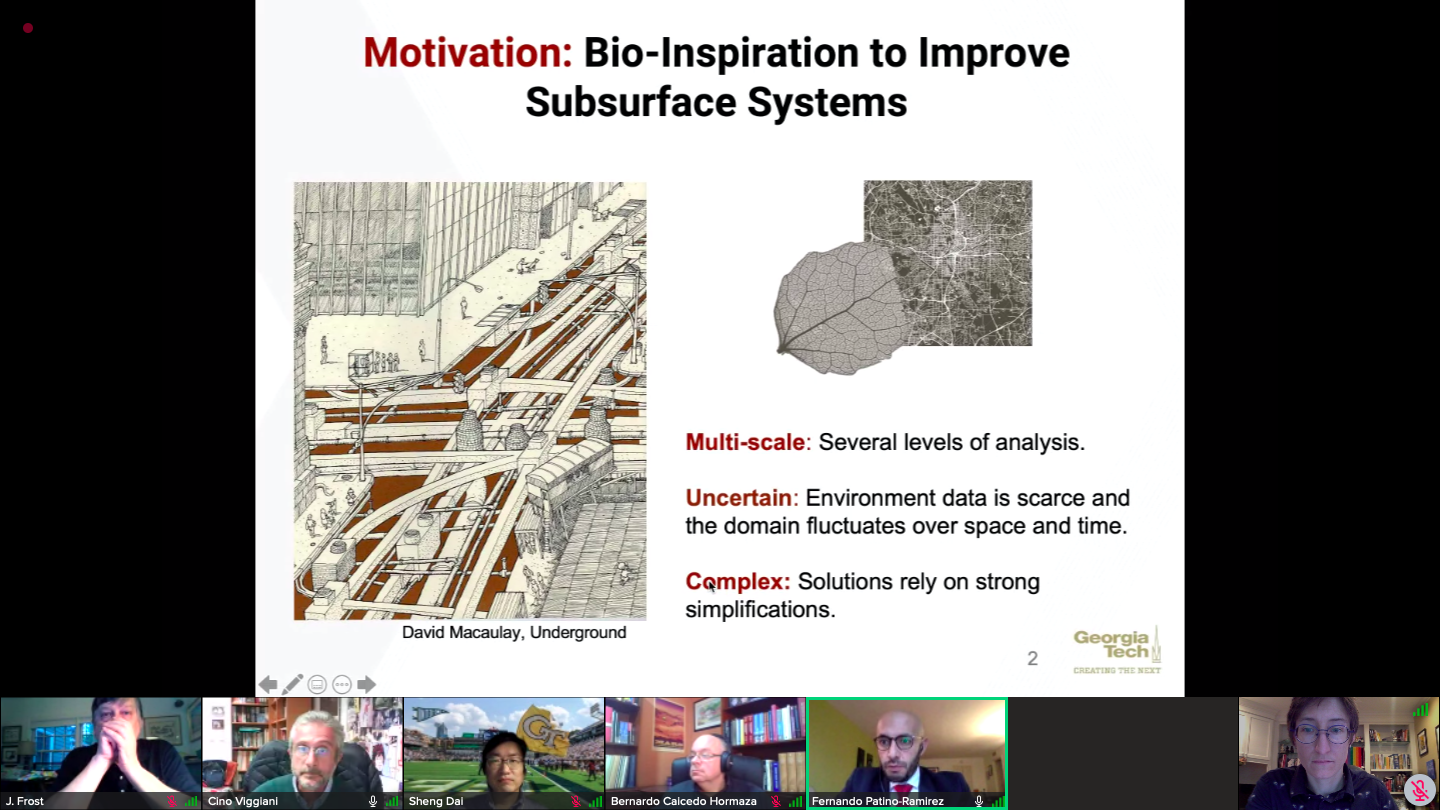
|
October 2020: Koochul Ji successfully defends his Ph.D. thesis
| Koochul Ji defended his Ph.D. thesis, entitled "Numerical modeling of mechanical recovery in damaged concrete repaired by epoxy at molecular and metric scales" in front of a committee constituted of Dr. C. Arson (Georgia Tech, CEE), Dr. S. Burns (Georgia Tech, CEE), Dr. Kim Kurtis (Georgia Tech, CEE), Dr. Olivier Pierron (Georgia Tech, ME) and Dr. L. Stewart (Georgia Tech, CEE). The defense was totally online - a difficult exercise! Koochul used Molecular Dynamics and the Finite Element Method to predict the stiffness and strength of concrete repaired by epoxy depostion. Starting with a fundamental study of the forces that link the concrete and the epoxy at molecular scale, he concluded his thesis with recommendations for pre-stressed steel reinforced concrete reparation in the field. Koochul will start an engineer position at Samsung (South Korea) in March 2021. |
|
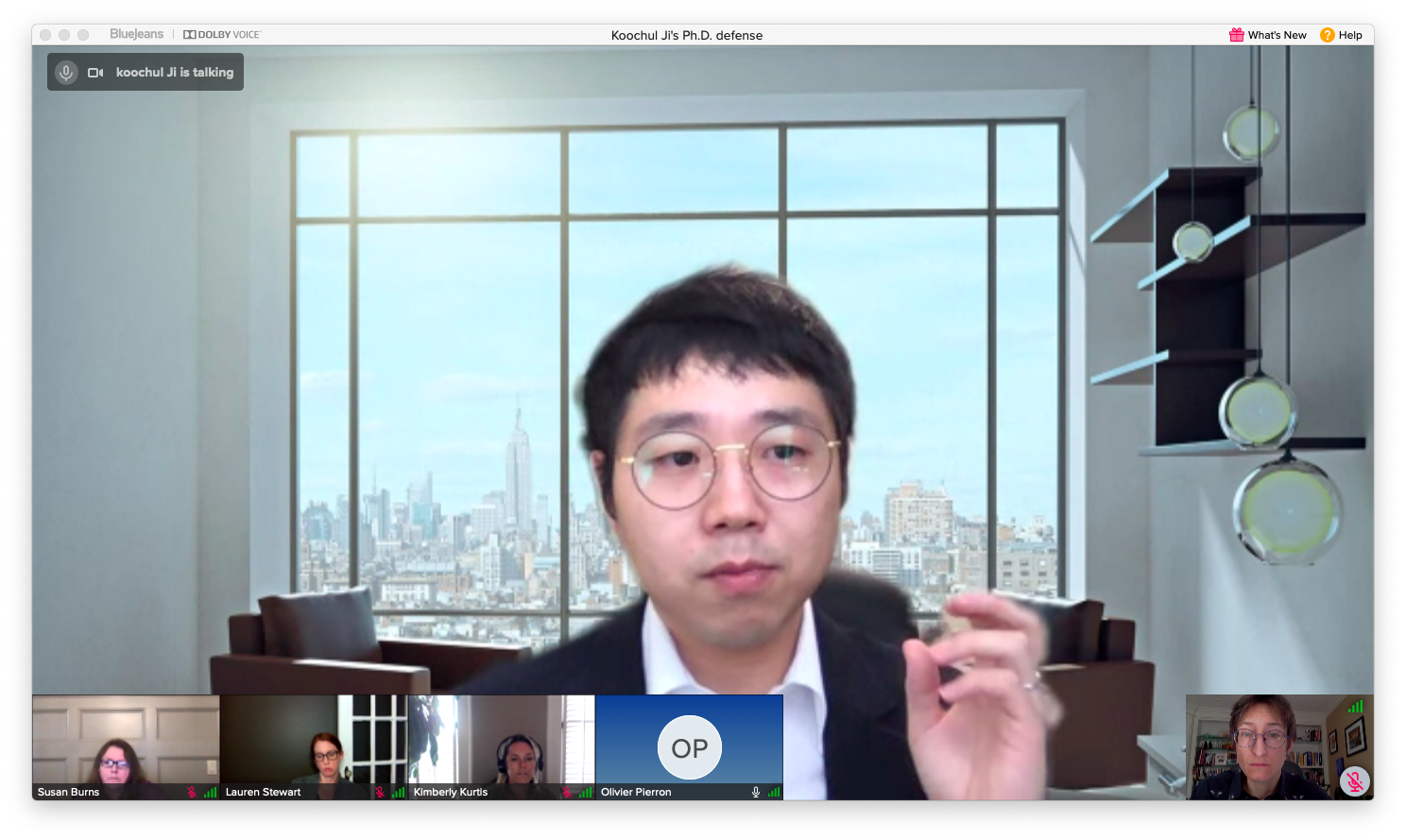
|
November 2019: Koochul and Tingting win poster awards
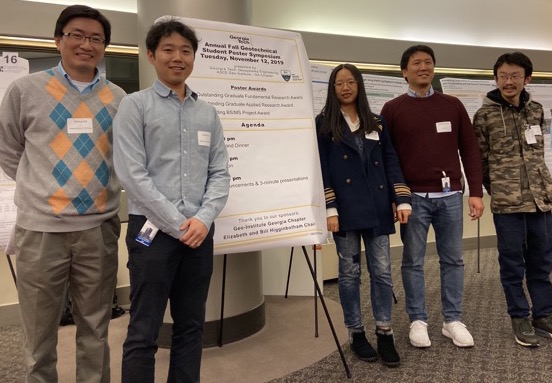
|
|
The Fall 2019 geo-poster symposium was held at the Georgia Power building. The event gathered faculty and graduate students from the Georgia Tech geosystems group, and practitioners from the Atlanta area. Prizes were awarded for fundamental graduate research, applied graduate research and undergraduate research. In the fundamental research category, Koochul Ji got the best poster prize and Tinging Xu got a runner up. Congratulations to both! |
October 2019: Xianda Shen defends his Ph.D. thesis
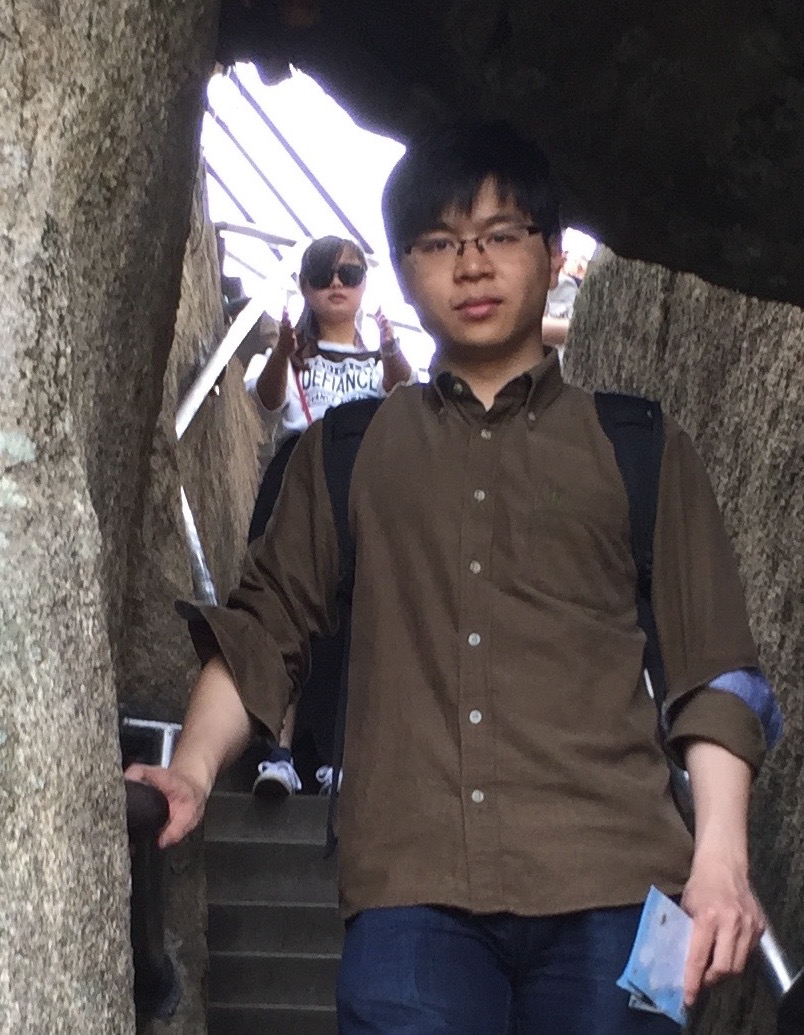
|
|
Xianda Shen defended his Ph.D. thesis, entitled "Micro-macro modeling of chemo-mechanical damage and healing in rocks" in front of a committee constituted of Dr. C. Arson (Georgia Tech, CEE), Dr. S. Burns (Georgia Tech, CEE), Dr. S. Dai (Georgia Tech, CEE), Dr. K. Ferrier (University of Wisconsin-Madison) and Dr. T. Zhu (Georgia Tech, ME). Xianda explored a variety of modeling techniques to relate the evolution of rock stiffness and strength with damage and healing to that of rock microstructure. He used innovative fabric tensor formulations and Eshelby's theory to better understand why complex crack patterns form in viscous rocks, why cracks heal, and how granite weathering produces soil. Xianda is now a post-doctoral researcher at Northwestern University. |
August 2019: Arson gets an NSF/UKRI grant to explore the subsurface
| Dr. Arson is the lead-PI of a grant entitled "Rapid deployment of multi-functional modular sensing systems in the soil," which was awarded by the U.S. National Science Foundation (NSF) and the United Kingdom Research Innovation (UKRI), to the amount of $1.7 million. The initiative gathers an inter-disciplinary team of five professors at Georgia Tech (Arson and Frost in Civil and Environmental Engineering, Hammond in Bio-Medical Engineering, Chau in Computer Science Engineering and Goldman in Physics) and four Professors at Imperial College London (O'Sullivan in Civil Engineering, Dini and Reddyhoff in Mechanical Engineering and Holmes in Electrical and Electronic Engineering). The project aims to develop a multi-functional modular sensing system known as the Burrowing Robot with Integrated Sensing System (BRISS). Link to the full story. |
|
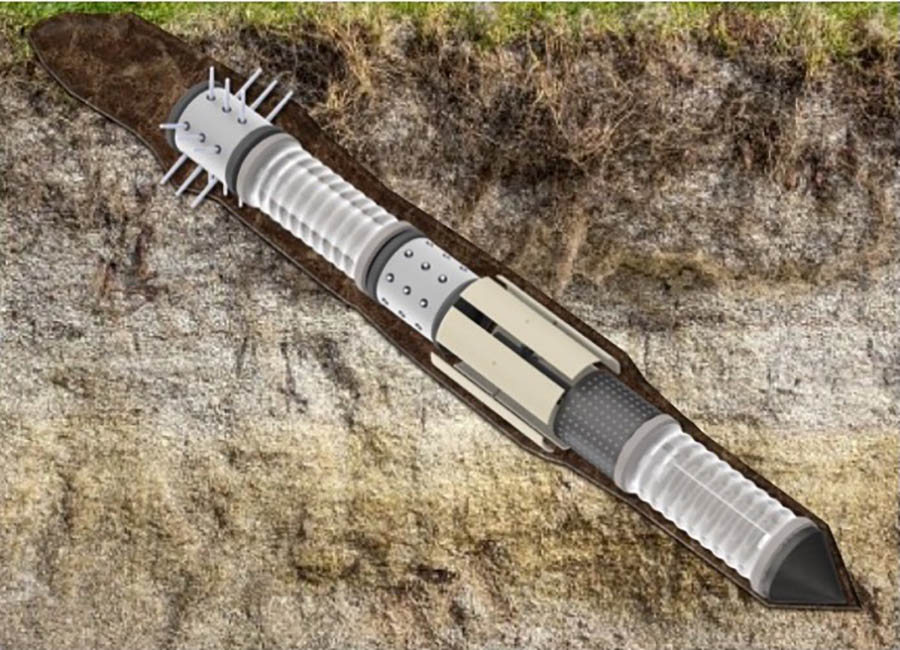
|
January 2019: The DeeP MeLT in the EMI Newsletter
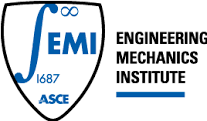
|
|
For the second time, the Research Group Profile of the DeeP MeLT was published in the newsletter of the ASCE Engineering Mechanics Institute. A nice way to spread the word about our expertise and projects and to build a scientific network! Link to the newsletter. |
December 2018: Pei Wang successfully defends his Ph.D. thesis
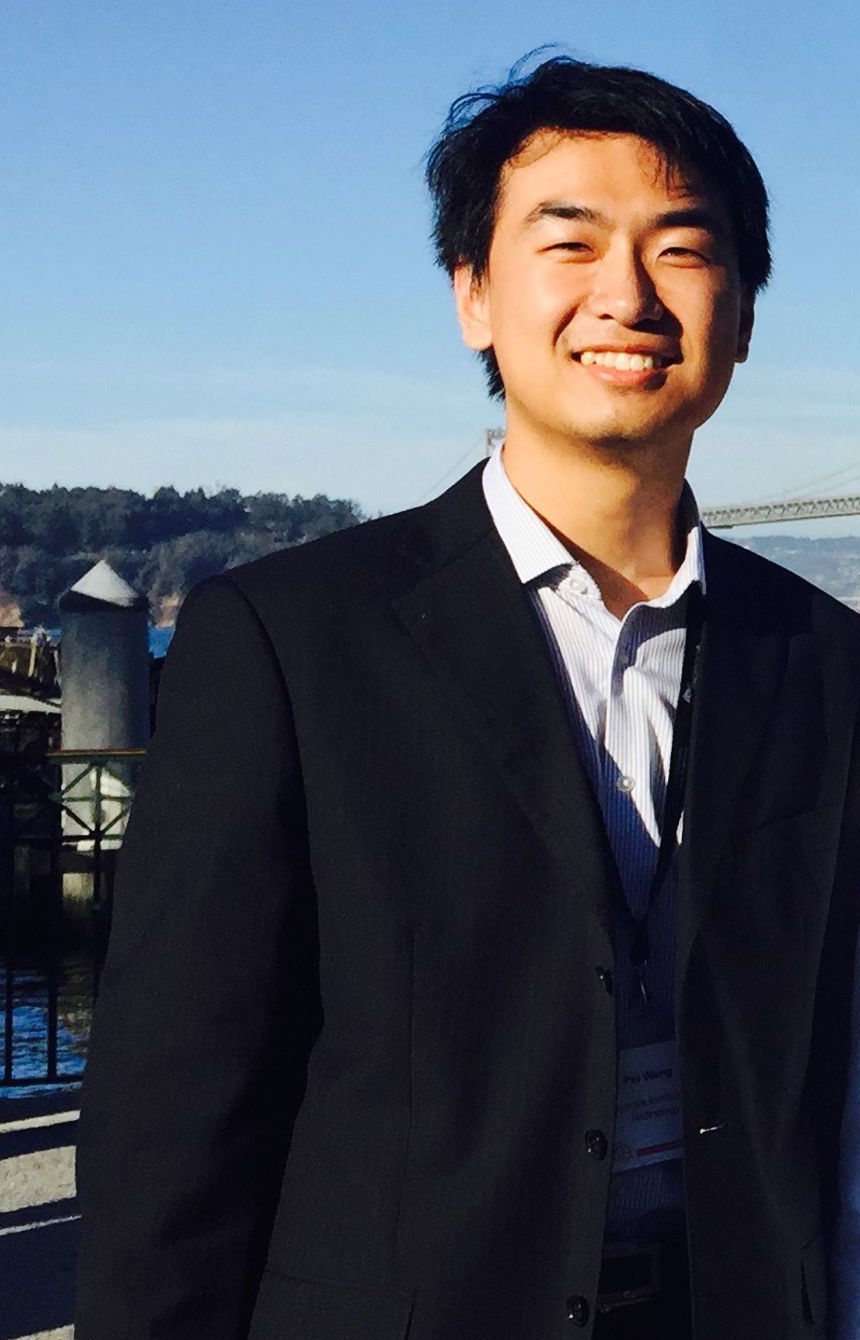
|
|
Pei Wang defended his Ph.D. thesis, entitled "Micro-mechanical analysis of quasi-static particulate fragmentation applied to geomaterials" in front of a committee constituted of Dr. C. Arson (Georgia Tech, CEE), Dr. J.D. Frost (Georgia Tech, CEE), Dr. S. Dai (Georgia Tech, CEE), Dr. R. Neu (Georgia Tech, ME) and Dr. G. Viggiani (L3SR, France). Pei is an expert in DEM modeling of particle crushing and fracture propagation, who collaborates with experimentalists in soil mechanics and structural mechanics. Pei is now a post-doctoral researcher at Hong Kong Polytechnic University. |
July 2018: Wencheng Jin defends his Ph.D. thesis and gets two PhD awards
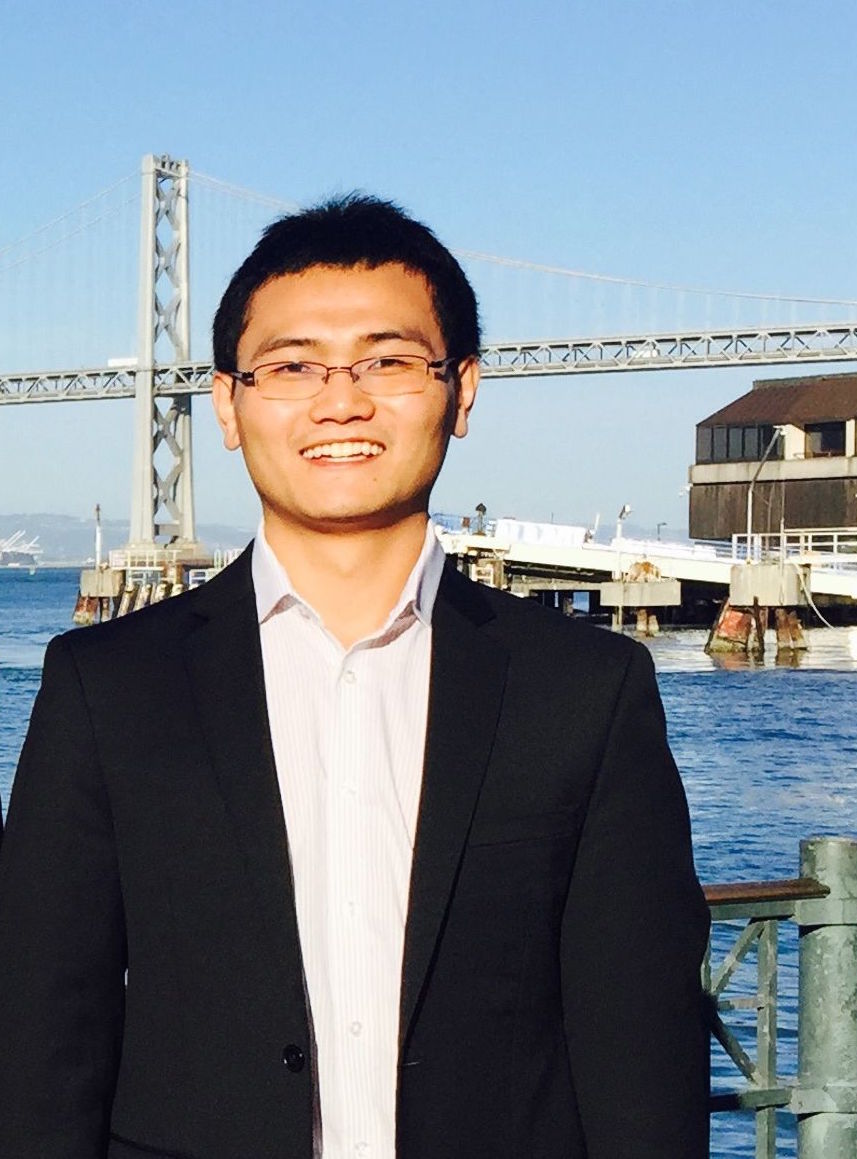
|
|
Wencheng Jin defended his Ph.D. thesis, entitled "Computational Modeling of the Transition from Damage to Fracture in Intrinsically Anisotropic Porous Media" in front of a committee constituted of Dr. C. Arson (Georgia Tech, CEE), Dr. J.D. Frost (Georgia Tech, CEE), Dr. G. Paulino (Georgia Tech, CEE), Dr. R. Neu (Georgia Tech, ME), Dr. J. White (Lawrence Livermore National Laboratory) and Dr. R. Borja (Stanford University). Wencheng's doctoral work was recognized by two prizes: the George F. Sowers Distinguished Graduate Student Award (from the Geosystems group at the Georgia Tech School of Civil and Environmental Engineering) and the Best CEE Ph.D. Thesis Award (from the Georgia Tech School of Civil and Environmental Engineering). Wencheng is now a researcher at Idaho National Laboratory. All the best to the rising star! |
December 2017: Dr. Arson receives the CEE Inter-disciplinary Research Award
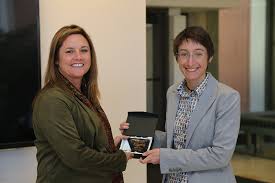
|
|
This prize, attributed every year, recognizes contributions through interdisciplinary research activities. The awards committee of Georgia Tech School of Civil and Environmental Engineering (CEE) examines a nomination package that includes a description of achievements, grants and publications. Dr. Arson's group was recognized for contributions made in rock mechanics, structural engineering and material sciences, as well as dentistry and biology, energy geotechnology, public policy, and sociology. |
May 2016: Cheng Zhu becomes a Doctor after getting an MSc award
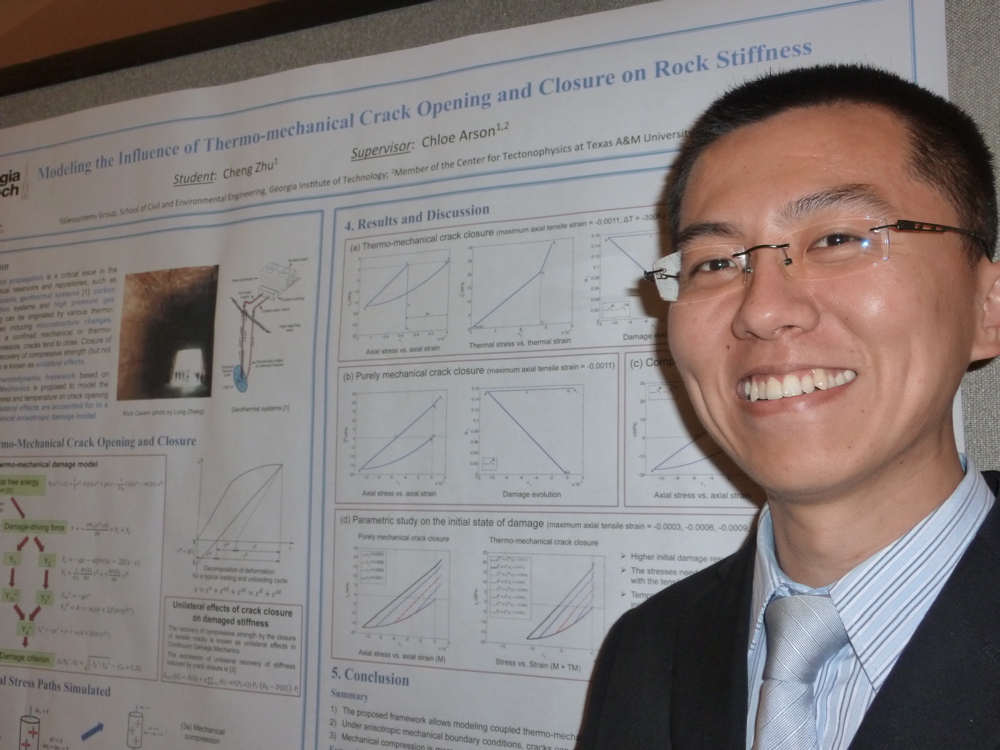
|
|
Cheng Zhu defended his Ph.D. thesis, entitled "Microstructure-based modeling of damage and healing in salt rock with application to geological storage" in front of a committee constituted of Dr. C. Arson (Georgia Tech, CEE), Dr. J.D. Frost (Georgia Tech, CEE), Dr. S. Dai (Georgia Tech, CEE), Dr. C. Huber (Georgia Tech, EAS), and Dr. A. Pouya (Ecole des Ponts Paris Tech, France). In addition, Cheng is the recipient of the James S. Lai Distinguished Master's Student Award (from the Geosystems group in Georgia Tech School of Civil and Environmental Engineering). Congratulations to the young salt! After a one year post-doctoral position at the Bureau of Economic Geology at the University of Austin, Cheng became an Assistant Professor at Rowan University. |
January 2016: Dr. Arson receives the prestigious NSF Early CAREER Award

|
|
The CAREER is the National Science Foundation's most prestigious award in support of junior faculty who exemplify the role of teacher-scholars through outstanding research, excellent education and the integration of education and research within the context of the mission of their organizations. Dr. Arson's project is entitled: "Multiphysics Damage and Healing of Rocks for Performance Enhancement of Geo-Storage Systems - A Bottom-Up Research and Education Approach". |
October 2015: Dr. Arson is selected to participate in the Frontiers of Engineering Education Symposium, sponsored by the NAE
| Dr. Arson was selected and sponsored by the National Academies of Engineering (NAE) to participate in the Frontiers of Engineering Education Symposium held in Irvine, CA on October 25-28, 2015. The symposium is designed to recognize accomplishment, facilitate learning, and broaden collaboration of innovative practices in engineering education. Each year FOEE brings together a select group of outstanding U.S. engineering educators, nominated by their respective engineering deans and members of the academy, to actively participate in the Symposium and then return to their individual campuses to effect change. |
September 2015: Dr. Arson talks about fracking on NPR
| On Septemer 9, 2015, Dr. Arson gave a live interview NPR (WABE 90.1 FM) for the program "A Closer Look" hosted by R. Scott and D. O'Hayer: Future Of Fracking In Georgia Dependent On Several Issues. |
September 2015: Dr. Arson presents fracking to Middle School Students
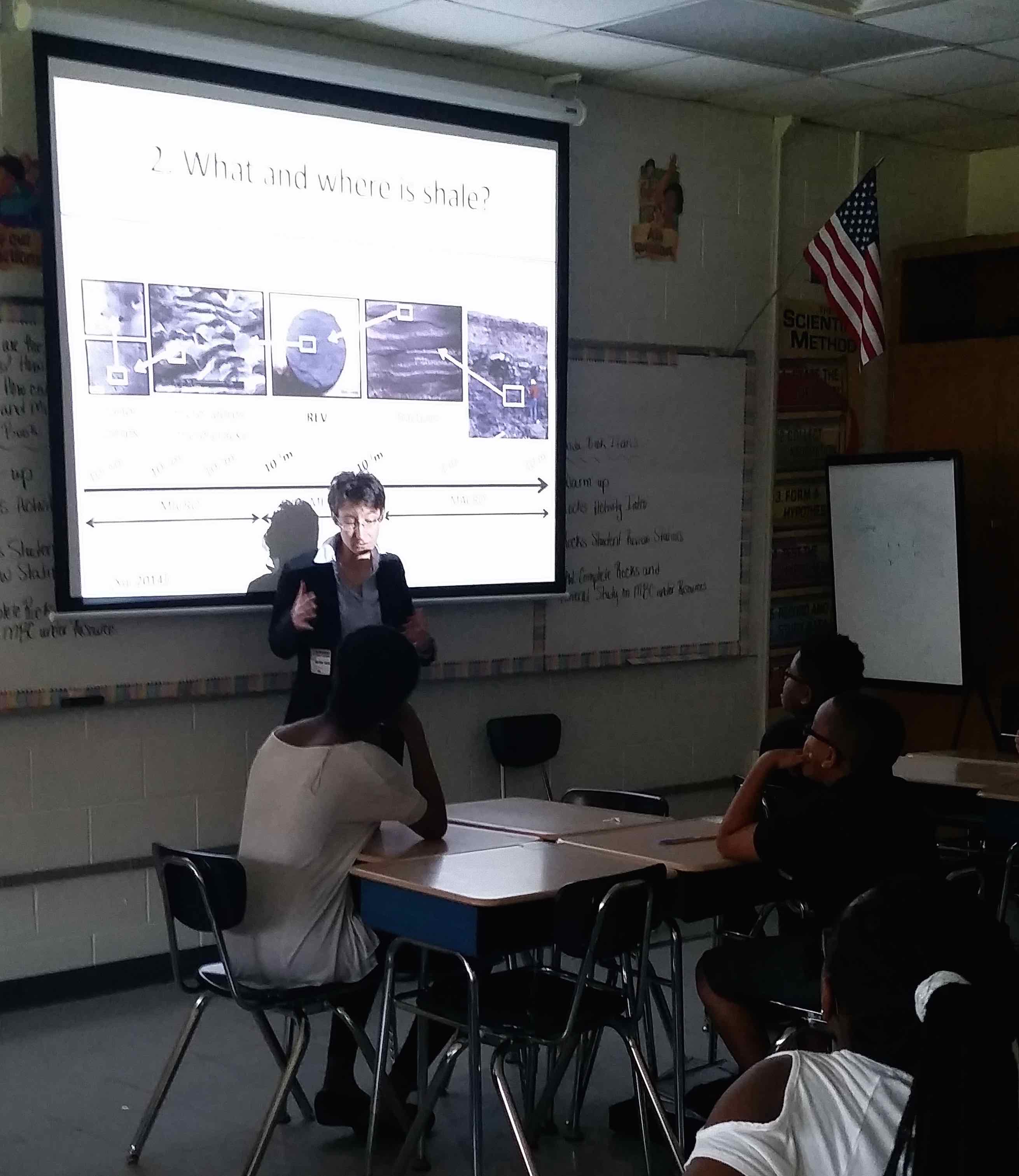
|
|
On September 4, 2015, Dr. Arson spent half a day in Memorial Middle School (Conyers, GA) to present the process of hydraulic fracturing to 6th-grade students. The presentation was followed by discussions about the environmental impacts of hydraulic fracturing and the future of non conventional gas extraction in Georgia. |
August 2015: Engineering Research Center for Bio-Mediated and Bio-Inspired Geotechnics (CBBG)

|
|
Arizona State University, Georgia Tech, New Mexico State Univesity and the University of California Davis were awarded a grant to support the Engineering Research Center for Bio-Mediated and Bio-Inspired Geotechnics (CBBG) by the National Science Foundation. This prestigious grant will provide support to the four institutions for five years. The DeeP MeLT, which is part of the center, will work on the modeling of flow network formation and on bio-inspired design of interwoven flow network applied to subsurface utility systems. Dr. Arson is also responsible for the cross-cutting thrust on numerical bio-THCM modeling for the CBBG. |
July 2014: Hao Xu successfully defends his PhD thesis
| Hao Xu officially graduated on December 12, after defending his Ph.D. thesis on "Theoretical and Numerical Modeling of Anisotropic Damage in Rock for Energy Geomechanics" in July. The Ph.D. committee included Dr. C. Arson (Georgia Tech, CEE), Dr. S. Busetii (ConocoPhillips, Computational Geomechanics group in Houston, TX), Dr. F.M. Chester (Texas A&M University, Geosciences), Dr. J.D. Frost (Georgia Tech, CEE), Dr. C. Huber (Georgia Tech, EAS), and Dr. J.C. Santamarina (Georgia Tech, CEE). The jury was impressed by the quality of the work and asked many questions that will inspire us for future research. Big moment for the entire group and for our families. Congratulations and good luck to you, Hao! After a short post-doctoral position at Princeton University, Hao became a researcher at the Lawrence Berkeley National Laboratory. |
|
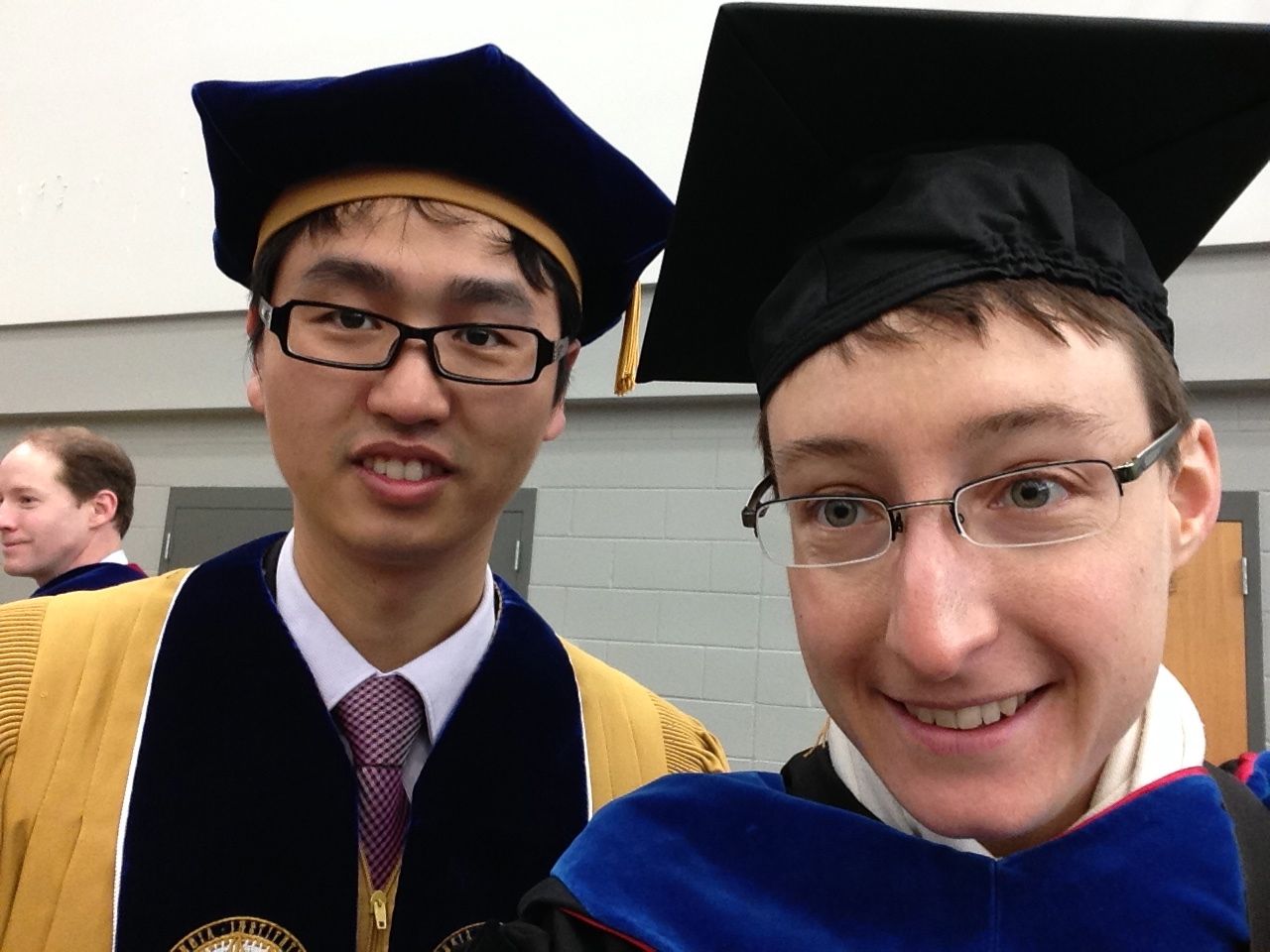
|
February 2014: Dr. Arson becomes adjunct faculty in the School of Earch and Atmospheric Sciences
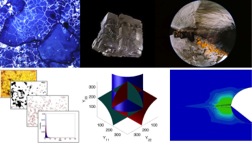
|
|
Dr. Arson is now and Adjunct Professor in the School of Earth and Atmospheric Sciences. A confirmation of the interest of the DeeP MeLT for rock mechanics at all scales! Many thanks to all the colleagues and students who supported Dr. Arson's application. This is an honor, an encouragement and a responsibility! |
December 2012: The DeeP MeLT in EMI Newsletter!
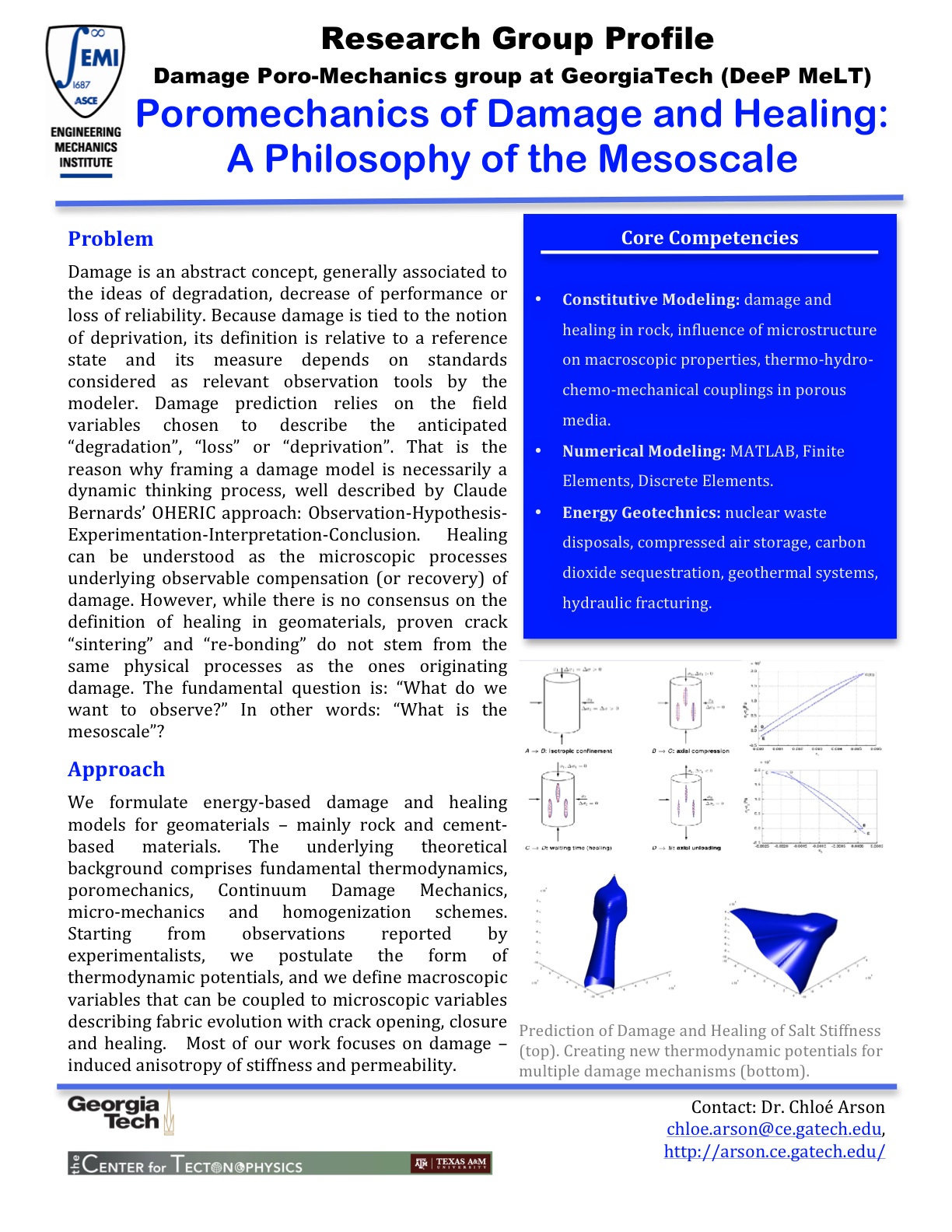
|
|
In December 2012, a Research Group Profile presenting the DeeP MeLT was published in the monthly newsletter of the ASCE Engineering Mechanics Institute. |
